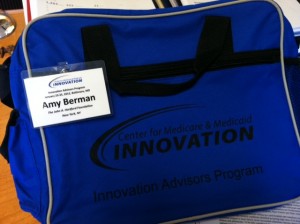 Recently I attended the launch of the Innovation Advisors Program. This new program has been described as the Peace Corps for health reform and as the missing workforce ingredient for quality improvement in the health care system. It provides six months of training for people who are committed to increasing their skills in quality improvement, change management, and advancing the triple aim (better care, better health, and lower cost).
Recently I attended the launch of the Innovation Advisors Program. This new program has been described as the Peace Corps for health reform and as the missing workforce ingredient for quality improvement in the health care system. It provides six months of training for people who are committed to increasing their skills in quality improvement, change management, and advancing the triple aim (better care, better health, and lower cost).
We at the Hartford Foundation think that these are important aims, and we also believe that this is an important approach to the problem of health care redesign. Since 2007 the Foundation has co-funded (with The Atlantic Philanthropies) the Practice Change Fellows program, an interdisciplinary training program for health care professionals with clinical expertise in care of older adults who have or would like to use their managerial responsibilities within their organizations to improve care. The Practice Change Fellows Program is led by Eric Coleman, a leading expert on care transitions at the University of Colorado, and Nancy Whitelaw, founding Director and currently Senior Fellow in the Center for Healthy Aging at the National Council on Aging. The staff at the Innovation Center and ORISE have studied the Practice Change Fellows Program as part of their design of this new program, and we encouraged as many of our network members as possible to apply.
Out of more than 900 applicants, The Center for Medicare and Medicaid Innovation (CMMI) selected 73 talented individuals from 27 states, all focused on developing and spreading innovations that achieve the three-part aim of better health, better care and lower costs.
The Innovation Advisors represent medicine, nursing, pharmacy, technology, and other expertise. Their interests include acute care, homecare, accountable care organizations, primary care redesign, improving care transitions, reducing avoidable readmissions, patient-centered care, health information technology, optimizing chronic care, and more. A significant number of the Innovations Advisors are interested in the population that we at the John A. Hartford Foundation focus on, older adults. Looking at project titles, we’ve estimated that between 20 and 30 of the Advisors are working on projects aimed at improving the care of older Americans. In fact, two of the awardees are alumni of the Practice Change Fellows Program—Jude Rabig and Randi Berkowitz. They are back for more!
At this kickoff, there was a lot of logistical ground to cover. The program is still being designed even as it rolls out. But, the leadership at the Innovation Center invested significant time and attention to it, with talks by Marilyn Tavenner, acting CMS director, Rick Gilfillan, Innovation Center director, and Todd Park, chief technology officer. Attendees also received a tour of CMS’ inner sanctum. These 73 represent the first wave of what is expected to be 200 Innovation Advisors within the year. CMS senior advisor Joe McCannon summed the program up best:
This is an opportunity to deepen your skills in innovation and improvement so that you can become leaders in your communities. Innovation Advisors will help test and refine innovative payment and service delivery models. Work with us in pursuit of the three-part aim of better health, better care, and lowering costs through continuous improvement. With your help, we can deepen the nation’s capacity for transforming the healthcare system by establishing a network of experts in delivery system reform.
One advisor at the meeting, a geriatrician, remarked that she estimated ten geriatricians were at the meeting. Given the paucity of geriatricians she wondered if we might be creating a temporary shortage in the field. Despite that dark humor, I was pleased to see a critical mass of geriatric experts among the founding cohort. We are very hopeful that we will be able to partner with the program and the Advisors to advance our common mission. Bravo to CMS, the Innovation Center, and the program’s architect, Don Berwick.
